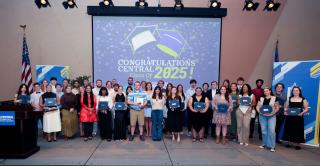
Civil Engineering Program
Mission Statement
The mission of the civil engineering program is to provide students with a broad and thorough education in civil engineering fundamentals, applications, and design that prepares them for the practice of civil engineering at the professional level with the confidence and skills necessary to meet the technical and social challenges of the future. The program provides a broad and thorough education in mathematics, physics, chemistry, engineering mechanics, and civil engineering, coupled with application of modern engineering tools. Graduates will attain the skills for entry-level civil engineering positions leading to professional engineering registration, and will have a solid undergraduate foundation in general civil engineering principles, enabling continued education at advanced levels.
Vision Statement
The civil engineering program will serve Connecticut and the nation by providing a quality engineering education that enables students to enter a profession that can improve the civil infrastructure, and economic welfare. Our civil engineering program will maintain a strong emphasis on undergraduate education with the goal that our program will be recognized for quality instruction in civil engineering analysis and design. An important emphasis of the civil engineering program is preparation of students for professional engineering licensure and practice, and we expect that most of our students will pursue this objective following graduation.
Civil Engineering Program Educational Objectives
Guided by the Mission of the University, the Civil Engineering program is committed to preparing students who will be thoughtful, responsible, and successful citizens. Within three to five years of graduation, the program expects that Civil Engineering graduates will have:
- Become competent and engaged engineering professionals, applying their technical and managerial skills in the planning, design, construction, operation or maintenance of the built environment and global infrastructure, and utilizing their skills to analyze and design systems, specify project methods and materials, perform cost estimates and analyses, and manage technical activities in support of civil engineering projects.
- Initiated an active program of life-long learning, including studies leading to professional licensure or an advanced degree in engineering, that provides for continued development of their technical abilities and management skills, and attainment of professional expertise.
- Developed their communication skills in oral, written, visual and graphic modes when working as team members or leaders, so they can actively participate in their communities and their profession.
- Established an understanding of professionalism, ethics, quality performance, public policy, safety, and sustainability that allows them to be professional leaders and contributors to society when solving engineering problems and producing civil engineering solutions.
Civil Engineering Student Outcomes
Civil Engineering graduates will have:
- an ability to identify, formulate, and solve complex engineering problems by applying principles of engineering, science, and mathematics;
- an ability to apply engineering design to produce solutions that meet specified needs with consideration of public health, safety, and welfare, as well as global, cultural, social, environmental, and economic factors;
- an ability to communicate effectively with a range of audiences;
- an ability to recognize ethical and professional responsibilities in engineering situations and make informed judgments, which must consider the impact of engineering solutions in global, economic, environmental, and societal contexts;
- an ability to function effectively on a team whose members together provide leadership, create a collaborative and inclusive environment, establish goals, plan tasks, and meet objectives;
- an ability to develop and conduct appropriate experimentation, analyze and interpret data, and use engineering judgment to draw conclusions; and
- an ability to acquire and apply new knowledge as needed, using appropriate learning strategies.


